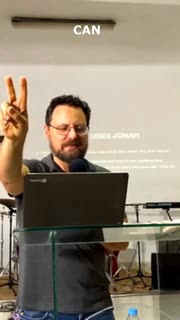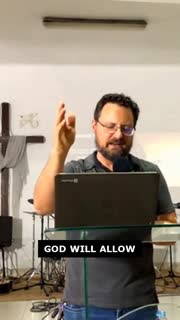Embracing Obedience: Lessons from Jonah's Journey
Devotional
Sermon Summary
Bible Study Guide
Sermon Clips
### Quotes for Outreach
1. "When you receive that identity, it's such a blessing. And so that's, that's, that's something that Israel wasn't doing in the northern kingdom. He, he and, he was a prophet during the reign of King Jeroboam II in the north and King Uzziah in the south. Okay. So Uzziah comes in, into the picture in Isaiah." [04:02] (22 seconds)
2. "When you run from God, what you tell yourself is, I'm only hurting myself. But who you're actually hurting is everyone around you. You know, it would be true in my life, wouldn't it? If you found out that some strange impropriety had happened in my life and you found that out as a pastor. I'm not a pastor. This isn't a big church. But there's a lot of people here. There's a lot of people in this town that know me. That would affect a lot of people. It would discourage them. Don't you believe that? I believe that." [17:18] (34 seconds)
3. "No heart is too dark. No sin is too great. And no hurt is too deep for grace to heal it. Somebody say amen. So don't give up on your neighbors. Don't give up on your neighbors. They can come to the Lord. When God saw their deeds and that they turned from their evil ways, then God relented of the disaster, which he had declared that he would bring on them, so he did not do it." [45:08] (24 seconds)
4. "It's never too late to call on God. And when I say call on God, I'm not saying tell God what to do. It's not what I'm saying. I'm saying call on God and let him speak to you. So God commanded the fish. God has authority over that which imprisons us. God has authority over the fish. So, Bible says the word of the Lord came to Jonah. I believe that's supposed to be chapter 2 or 3. Chapter 3. A second time. Somebody say a second time." [34:16] (29 seconds)
5. "If God can pull me from this fish, God can send me to Nineveh. If God can save my life today, I'm not worried about my life tomorrow. The only thing that changed for Jonah and the only thing that needs to change for us is our perspective of the problem. Hallelujah. that's why you need prayer. That's why you need prayer. That's why. Because when God gets small, the world gets really big and scary." [32:14] (36 seconds)
### Quotes for Members
1. "When we take on the identity that God has, not given us, somebody say amen, we begin to distance ourselves from God because our identity, our identity should be in God and nothing less. Amen. If you can't find your identity in this book, you're reading it wrong. Amen. I mean, if you can't find your identity here, there's something, there's, you're reading it wrong because God wants to give you your identity. He gives you your identity multiple times throughout the book." [04:02] (33 seconds)
2. "When you're a child of God that's running from God, you have missed your purpose, and there's something inside you that knows that you missed the mark, and so your life becomes less interesting, and it's the grace of God that that happens to you because it's that pain in your heart that you know is troubling you, that pushes you. It pushes you to say, Lord, I have sinned. Thank God. Thank God for my conscience." [13:01] (32 seconds)
3. "Learn to pray for yourself. Learn to take time to pray for yourself. For the sake of your children, for the sake of your wife, for the sake of the people around you, for the sake of your own mental health, learn to take time to pray for the issues in your life. Amen? Learn to do that. Don't just say, Well, you know, I go to church and I know. Learn to take time with Jesus because I can promise you if you sleep rather than call upon the name of the Lord, tragedy is going to fall on you." [19:12] (36 seconds)
4. "God can use that sorry pastor that you don't like. Hallelujah. Hallelujah. God can use that terrible pastor that you think is no good and doesn't... can't do anything. God can use him and you don't have to understand it and you don't have to like it and it's none of your business. Hallelujah. God can use people. Because God is God. He can use people. To the men of God being used of God or to the women of God being used of God. Do not think that your success comes from you. Hallelujah. Somebody say amen." [24:58] (42 seconds)
5. "God will allow you to sin, but the true loss is the good that you could have done if you had been obeying him. That's the disappointment. But the good news is, you can still follow him. And he can still take you. From glory to glory. God forgives Jonah, but he does not repeat the reason for sending him. He just sends him on the road once again. And that's the same for us. When God gives us a task, that task is not going to go away, even if time passes, even if our memory fades. That task was given to us." [37:12] (37 seconds)
Ask a question about this sermon
1. "When you receive that identity, it's such a blessing. And so that's, that's, that's something that Israel wasn't doing in the northern kingdom. He, he and, he was a prophet during the reign of King Jeroboam II in the north and King Uzziah in the south. Okay. So Uzziah comes in, into the picture in Isaiah." [04:02] (22 seconds)
2. "When you run from God, what you tell yourself is, I'm only hurting myself. But who you're actually hurting is everyone around you. You know, it would be true in my life, wouldn't it? If you found out that some strange impropriety had happened in my life and you found that out as a pastor. I'm not a pastor. This isn't a big church. But there's a lot of people here. There's a lot of people in this town that know me. That would affect a lot of people. It would discourage them. Don't you believe that? I believe that." [17:18] (34 seconds)
3. "No heart is too dark. No sin is too great. And no hurt is too deep for grace to heal it. Somebody say amen. So don't give up on your neighbors. Don't give up on your neighbors. They can come to the Lord. When God saw their deeds and that they turned from their evil ways, then God relented of the disaster, which he had declared that he would bring on them, so he did not do it." [45:08] (24 seconds)
4. "It's never too late to call on God. And when I say call on God, I'm not saying tell God what to do. It's not what I'm saying. I'm saying call on God and let him speak to you. So God commanded the fish. God has authority over that which imprisons us. God has authority over the fish. So, Bible says the word of the Lord came to Jonah. I believe that's supposed to be chapter 2 or 3. Chapter 3. A second time. Somebody say a second time." [34:16] (29 seconds)
5. "If God can pull me from this fish, God can send me to Nineveh. If God can save my life today, I'm not worried about my life tomorrow. The only thing that changed for Jonah and the only thing that needs to change for us is our perspective of the problem. Hallelujah. that's why you need prayer. That's why you need prayer. That's why. Because when God gets small, the world gets really big and scary." [32:14] (36 seconds)
### Quotes for Members
1. "When we take on the identity that God has, not given us, somebody say amen, we begin to distance ourselves from God because our identity, our identity should be in God and nothing less. Amen. If you can't find your identity in this book, you're reading it wrong. Amen. I mean, if you can't find your identity here, there's something, there's, you're reading it wrong because God wants to give you your identity. He gives you your identity multiple times throughout the book." [04:02] (33 seconds)
2. "When you're a child of God that's running from God, you have missed your purpose, and there's something inside you that knows that you missed the mark, and so your life becomes less interesting, and it's the grace of God that that happens to you because it's that pain in your heart that you know is troubling you, that pushes you. It pushes you to say, Lord, I have sinned. Thank God. Thank God for my conscience." [13:01] (32 seconds)
3. "Learn to pray for yourself. Learn to take time to pray for yourself. For the sake of your children, for the sake of your wife, for the sake of the people around you, for the sake of your own mental health, learn to take time to pray for the issues in your life. Amen? Learn to do that. Don't just say, Well, you know, I go to church and I know. Learn to take time with Jesus because I can promise you if you sleep rather than call upon the name of the Lord, tragedy is going to fall on you." [19:12] (36 seconds)
4. "God can use that sorry pastor that you don't like. Hallelujah. Hallelujah. God can use that terrible pastor that you think is no good and doesn't... can't do anything. God can use him and you don't have to understand it and you don't have to like it and it's none of your business. Hallelujah. God can use people. Because God is God. He can use people. To the men of God being used of God or to the women of God being used of God. Do not think that your success comes from you. Hallelujah. Somebody say amen." [24:58] (42 seconds)
5. "God will allow you to sin, but the true loss is the good that you could have done if you had been obeying him. That's the disappointment. But the good news is, you can still follow him. And he can still take you. From glory to glory. God forgives Jonah, but he does not repeat the reason for sending him. He just sends him on the road once again. And that's the same for us. When God gives us a task, that task is not going to go away, even if time passes, even if our memory fades. That task was given to us." [37:12] (37 seconds)










